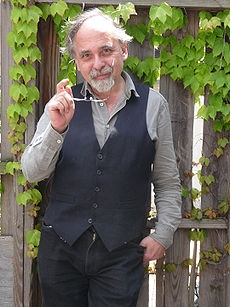 Art Spiegelman - Wikipedia, the free encyclopedia
Art Spiegelman - Wikipedia, the free encyclopedia
Art Spiegelman (born February 15, 1948) is an American cartoonist, editor and comics advocate, best known for his Pulitzer Prize-winning graphic novel Maus. His work as co-editor on the comics magazines Arcade and Raw has been highly influential, and he spent a decade as contributing editor of The New Yorker starting in 1992, where he also made a number of high-profile and sometimes controversial covers. He is married to FranÇoise Mouly.
Spiegelman’s work first gained prominence in the underground comix scene in the 1970s. His work in this period was short and formally experimental, and often included autobiographical elements. A selection of these strips appeared in the collection Breakdowns in 1977. After Breakdowns, Spiegelman wanted to work on a “very long comic book”. He settled on the theme of his father’s experiences during as a Holocaust survivor. The book, Maus, would take thirteen years to complete. It drew both praise and criticism for depicting Nazis as cats and Jews as mice. The book won a number of prizes, most prominently a special Pulitzer Prize. It has come to be viewed as a pivotal work in comics, responsible for bringing serious scholarly attention to the medium.
Spiegelman and Mouly edited eleven issues of Raw from 1980 to 1991. The oversized comics and graphics magazine helped introduce a number of talents that would become prominent in alternative comics, such as Charles Burns, Chris Ware, Ben Katchor and others. It also introduced a number of European and Japanese cartoonists to the English-speaking comics world. Beginning in the 1990s, the couple edited comics and cartoons at The New Yorker.
Spiegelman’s works are published with his name in lowercase: art spiegelman.
#rememberthis

